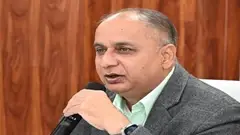
Could you provide us with a brief history of Zydex Industries and its foray into agriculture?
Zydex Industries was established by Dr. Ajay Ranka, a renowned polymer scientist with an impressive track record of 55 patents to his name. The company began its journey in 1997, primarily focusing on environmentally friendly inks in the textile division. Over time, Dr. Ranka diversified into various sectors, including roads, waterproofing, paints, and eventually agriculture. Agriculture, in particular, reflects Dr. Ranka's passion for providing safe and nutritious food to all, giving birth to the 'Agree Solutions' business. Zydex commenced its agricultural operations in 2014-15, pioneering the use of agriculture technologies.
Indeed, the shift towards bio-fertilizers is gaining momentum. However, transitioning from chemical to bio-fertilizers is no small feat for farmers. How do you propose to encourage farmers to make this switch?
Before delving into bio-fertilizers, it's crucial to understand the root problem farmers face. The Green Revolution of the early '70s introduced high-yielding varieties, mechanization, and chemical fertilizers, significantly boosting Indian agriculture. However, decades of indiscriminate chemical fertilizer usage and mechanization have taken a toll on our soils. Farmers now confront compacted soils, reducing oxygen and water availability for crops, limiting root development, and hindering natural nutrient absorption. This is the crux of the issue.
Zydex's bio-fertilizer, known as Zytonic, operates differently. It's a biodegradable, water-soluble polymer structure that penetrates the soil, enhancing soil structure and fostering biological activity. It also introduces essential microbes and nutrients, addressing soil health comprehensively. By improving soil structure, we enable crops to access more nutrients and water efficiently. Additionally, Zytonic enhances plant immunity, reducing the need for chemical pesticides. Farmers can transition without compromising yields or quality.
Can you shed light on the cost comparison between chemical fertilizers and bio-fertilizers?
Instead of framing it as a cost comparison, I'd like to emphasize value. In an acre of land, if a farmer spends Rs. 15,000 on chemical fertilizers, pesticides, and related inputs, they can achieve similar yields with Zydex's technology, incurring similar costs. It's not about being cheaper or more expensive, but about the added value. With Zydex, farmers experience no yield penalty, witness improved produce quality and shelf life, and can potentially fetch better prices due to chemical-free produce. So, while the initial costs may align, the long-term benefits far outweigh them.
Are there any government subsidies or support systems in place for bio-fertilizers?
While there have been discussions about government subsidy programs for bio-fertilizers, there hasn't been a formal announcement or implementation yet. Currently, the bio-fertilizer industry operates independently without government subsidies. However, if the government reduces subsidies for chemical fertilizers and supports the bio-fertilizer industry, it could trigger a substantial shift towards bio-fertilizers. Farmers often perceive chemical fertilizers as inexpensive due to subsidies, and a level playing field could promote bio-fertilizer adoption.
In your view, how can policies or support from the government accelerate this transformation?
There are two approaches to consider. Firstly, we can wait for government policies to change, which would indeed be beneficial. However, our recommendation to the government is to provide an opportunity for players like Zydex and others in the bio-fertilizer sector to demonstrate the effectiveness of their technologies. Give us a chance to showcase our capabilities by allocating a specific land area, say 2,000 to 5,000 acres, as a challenge.
This challenge should remain open to all biological solutions providers, allowing them to demonstrate their protocols. It should serve as a mass movement to shift towards chemical-free farming. To reach the vast farming community, collaboration with extension agencies and like-minded organizations is crucial. This collaborative effort can expedite the adoption process.
Dr. Singh, you mentioned the concept of a "billionaire farmer". Can you elaborate on this idea and its potential impact on Indian agriculture?
The notion of a "billionaire farmer" is a remarkable and noble concept. The agricultural sector has often been perceived as an arena where farmers struggle to make ends meet. However, there are numerous success stories of farmers who, with the right technology, knowledge, and information, have achieved substantial earnings and success.
To realize this concept fully, we must identify such successful farmers, acknowledge their achievements, and use them as examples to inspire others. These examples need to be expanded and scaled up. Farming can indeed be a profitable venture, and this shift in perception is crucial. By creating role models within the farming community, we can foster a sense of entrepreneurship among farmers, leading to widespread prosperity.
In conclusion, the adoption of bio-fertilizers like Zytonic represents a promising solution to the pressing challenges faced by Indian agriculture. It's a paradigm shift that not only offers financial benefits to farmers but also contributes to soil health, environmental sustainability, and the nation's overall economic growth. As we move forward, fostering a sense of empowerment and entrepreneurship among farmers will play a pivotal role in realizing a brighter future for Indian agriculture.
















Share your comments